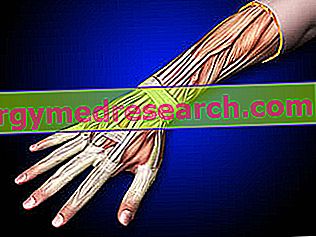Definition
Together with Crohn's disease, ulcerative colitis is one of the chronic inflammatory diseases of the intestinal tract: the target of ulcerative colitis is the large intestine (rectum and colon) where it exclusively affects the superficial layers of the internal intestinal walls.
Causes
Currently, no certain and definitive triggering cause has been identified: the therapy is aimed at reducing symptoms and preventing complications.
Symptoms
The symptoms that characterize ulcerative colitis can be of various entities: asthenia, weight loss, abdominal cramps, diarrhea, fever, general malaise, mucorrhea, blood in the stool, night sweats, constipation. The most formidable complication of ulcerative colitis is toxic megacolon (the colon paralyzes, and any passage of gas or material is denied).
Diet and Nutrition
Natural Care
Information on Ulcerative Colitis - Drugs for the Treatment of Ulcerative Colitis is not intended to replace the direct relationship between health professional and patient. Always consult your doctor and / or specialist before taking Ulcerative Colitis - Ulcerative Colitis Drugs.
drugs
Given that ulcerative colitis is one of the first causes responsible for colorectal cancer, it is first of all necessary to exclude a neoplasm by accurate diagnosis (colonoscopy). A light diet and abundant fluid intake is always recommended:
Aminosilicati
- Balsalazide (eg. Balzide): recommended in cases of mild to moderate ulcerative colitis. Or take 2250 mg of drug three times a day for 8-12 weeks. For children who have already reached the age of five, the dosage can be reduced up to 750 mg of active ingredient, but the intake must be repeated three times a day, for 8 weeks.
- Mesalazine or 5-aminosalicylic acid (eg. Asacol, Claversal): it is recommended to take rectally from 0.75 to 1.5 g of active ingredient in the form of suppositories, in divided doses, or a dose of 2 grams of rectal foam before bedtime. Repeat the application twice when necessary. Alternatively, take 2.4 g of drug per day, in divided doses.
- Olsalazine (eg Dipentum): for acute ulcerative colitis, take 500-1, 000 mg of active ingredient per day, divided into a double dose (preferentially after meals). If necessary, increase the dosage to 3 grams per day for up to one week. Important maintenance therapy: 500 mg of drug twice a day after meals, as established by the attending physician.
- Sulfasalazine (eg Salazopyrin EN): is a drug combined with 5-aminosalicylic acid (5-ASA) and sulphapyridine. Take rectally (suppositories) 0.5-1 g of drug in the morning and evening after evacuation. The active ingredient can also be found in the form of clisms: administer 3 g in the evening: keep the active ingredient for at least an hour. Alternatively, take 1-2 g of drug orally, repeating the operation up to 4 times a day
immunosuppressant
- CiclosporinaA (eg Sandimmun Neoral): take 4mg / kg per day intravenously continuous. The dose should be reduced gradually; the therapy should generally be continued for 7-14 days. Maintenance therapy is also important (3-6 months).
- Azathioprine (eg Immunoprin, Azafor): intravenously administer a dose ranging from 20 to 40 mg / kg (infusion period: 36 hours) or 40 mg / kg every 8 hours, followed by oral administration of the same active ingredient ( 2 mg / kg per day from the day immediately following the intravenous loading dose).
Glucocorticoids : can be administered rectally (topical action) or systemically (oral or intravenous).
- Hydrocortisone (eg Locoidon, Colifoam): take 100 mg of drug (rectal suspension) in the evening for 21 days or for remission of symptoms to occur. In severe cases, the therapy can be continued for 2 or 3 months. When the treatment does not give results within 2-3 weeks, stop taking the drug. When the therapy lasts over 21 days, slowly decrease the dosage before stopping the treatment. Consult your doctor.
- budesonide (eg. Biben, Pulmaxan): rectally, apply an enema a day, containing 2% budesonide, in the evening for 4 weeks.
- prednisone (eg. Deltacortene, Lodotra): take on the palate 20-40 mg a day in a single dose or in several doses. The drug can also be taken rectally: an enema of 20 mg in the evening for 2-4 weeks.
In case of no response to drug therapies, patients suffering from ulcerative colitis must undergo surgical resection of the colon.
In the case of ulcerative colitis, the patient should follow a healthy and balanced diet, drink plenty of fluids and play sports:
- abolish spicy, spicy foods
- avoid sodas, tea, wine and coffee
- don't eat chocolate
- limit consumption of dairy products
- take probiotics
- prefer refined foods (avoid introducing too many fibers)
By following these simple steps, patients with a history of ulcerative colitis can prevent relapses. It is recommended to follow these rules even during drug therapy against ulcerative colitis.



